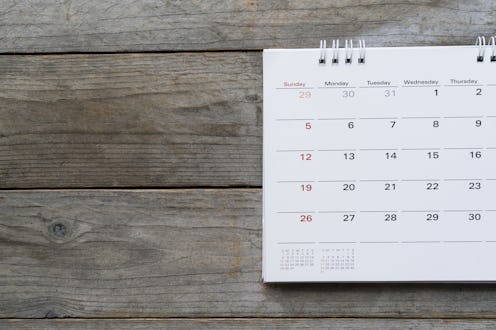
Between the freezing cold weather (ugh) and a little holiday some of us would like to forget called Valentine's Day (double ugh), it's a small blessing that February is only 28 days long — except, of course, when it's a leap year, in which case we get to endure an entire extra day. When is the next leap year? This year, Feb. 29 is Leap Day, which makes 2016 a very unique year indeed. So, mark your calendars now, because it's going to be a while before we see that date again.
Leap Day is definitely a strange holiday. On the one hand, you have an entire extra 24 hour period of time to do all the things you wouldn't normally have time to do otherwise. But, while Leap Day is certainly a unique exception to the calendar, it's not like you're getting the day off from work or anything — Leap Day isn't a bank holiday. What's more, this year's Leap Day falls on a Monday, meaning you're expected to be extra productive on your least favorite day of the week — bummer.
Whether you love Leap Day or hate it, there's no avoiding it — at least, not this year. The next leap year isn't until 2020, so if this calendar anomaly freaks you out, you have some time before you have to worry about it again. If you love it? Well, make the most of Feb. 29, 2016, because it's going to be a while before you get to celebrate another leap year.
Why do we celebrate Leap Day every four years?
Let's back up a minute, shall we? What is Leap Day, and why do we only observe it every couple of years? Although we've all had it ingrained in our minds that a year is 365 days long, because that's how many days it takes for the Earth to travel around the sun, that isn't entirely correct. In fact, it takes the Earth 365.2422 days to complete its journey (that's 365 days, five hours, 48 minutes, and 45 seconds, for those of you keeping track). Having an extra day every four years is necessary to keep the calendar in sync with the planet's trip around the sun — otherwise, the Farmer's Almanac explains the seasons would be off by almost 25 days in just 100 years.
When did Leap Day start?
Leap Day is believed to have been implemented by none other than Julius Caesar as early as 45 BCE. He hired his astronomer Sosigenes to find a way to keep the Julian calendar more accurately in sync with the Earth's orbit. Pope Gregory later adopted Leap Day into the Gregorian calendar, albeit with a few tweaks.
How can you tell if it's a leap year?
It takes a little math, but it's possible to determine if a year is a leap year without ever consulting your calendar. As a general rule, leap years are divisible by four. That being said, not all century years are leap years. In order to tell if a century year is a leap year, try dividing it by 400. If it works out evenly, it's a leap year. How's that for being self-sufficient?
So, when you roll out of bed on Monday, do so knowing that this is no ordinary Monday. Leap Day is actually pretty darn important as far as our calendars go. It may be weird, but it's one of the many reasons this year is so unique. Embrace it.
Images: Fotolia; Giphy